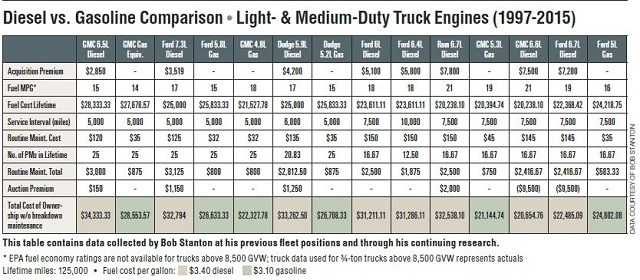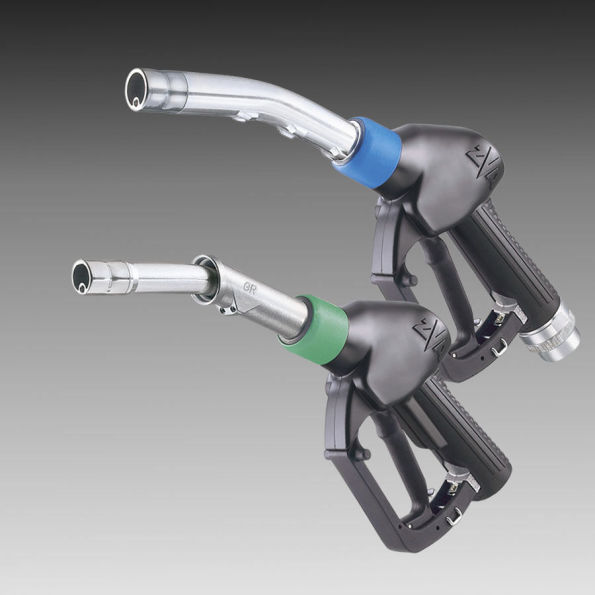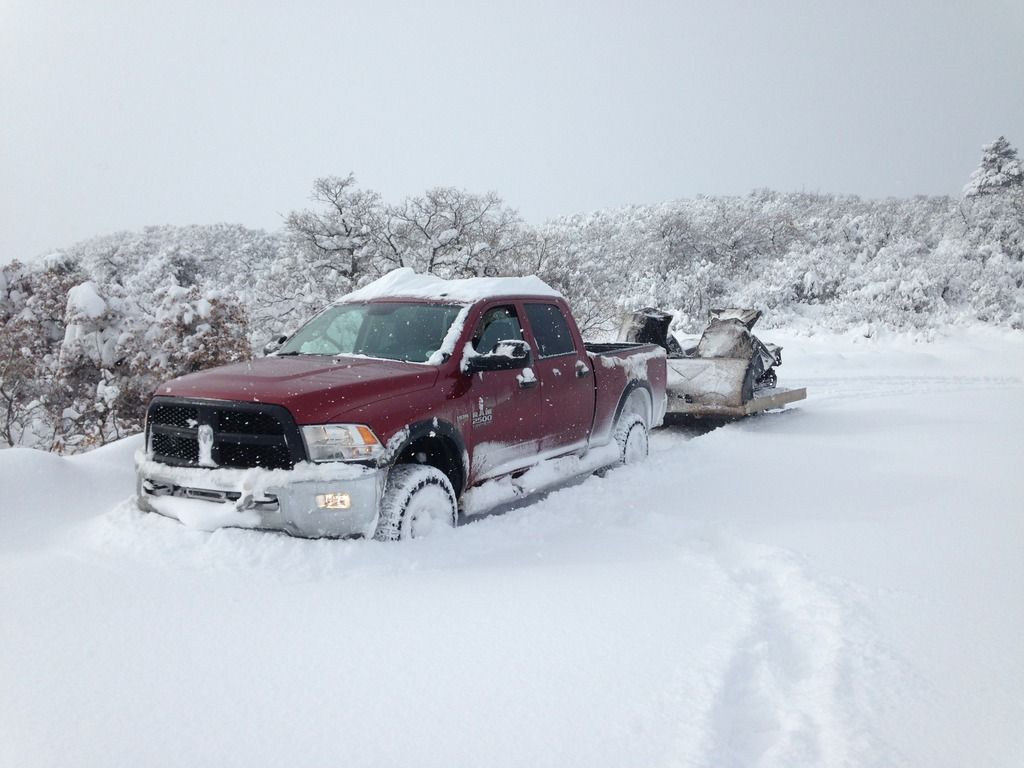http://www.trucktrend.com/features/1501-gas-vs-diesel-past-present-and-future/
Fuel Economy: Diesel Still Leads, But Margin Narrows
Conventional wisdom was that diesel was the only way to deliver significant fuel economy improvements in trucks. However, the growing emergence of direct-injected and turbocharged gasoline engines have made the fuel economy difference between gas and diesel engines much smaller than before. Seredynski said that regardless of fuel, the end goal is the same: maximum power from the minimum amount of fuel.
Back in the '90s and early 2000s, the difference was often more than 30 percent. At that time, some of the gasoline engines in the truck market were just starting to transition over to port fuel injection, and almost all truck engines were still two-valve. Today, advancements on gasoline engines, such as direct-injection, cylinder deactivation, variable valve timing, and turbocharging, have given powertrain engineers a vastly broader toolkit from which to build gasoline engines that are both economical and powerful.
The
Ram 1500 EcoDiesel is the current fullsize pickup mileage champ at 20/28 mpg in EPA testing, but Ford's new 2.7L EcoBoost V-6 is will likely not be far behind. Another enabling technology that has increased economy on both gas and diesel engines are transmissions with much higher gear counts, with six speeds now considered the bare minimum, just as eight-speeds and higher are starting to become the norm.
Refinement: Gas, But Barely
Diesel engines have evolved tremendously over the last 20 years in almost every area, but perhaps the most impressive strides have been made in the area of noise, vibration and harshness, otherwise known as NVH. In the '80s and '90s, it was not uncommon to have to turn your engine off in the drive-through so the cashier could hear your order. On some of today's trucks, the engine type is almost imperceptible from the driver seat. The biggest enabler of this is vastly more sophisticated injection technology, which has made diesels nearly the peer of their gasoline counterparts.
In the case of direct fuel injection, the technology has had a different effect on gasoline and diesel engines. While many gasoline direct-injection engines have a characteristic injector "tick," the technology has enabled diesel combustion events to get much quieter, thanks to the use of pilot injection and multiple injection pulses per combustion event. This reduces the sudden combustion pressure spike that's the culprit in the familiar diesel clattering noise. The added noise of the direct injectors is only noticeable from the inherently quieter operation of gasoline engines. "It's interesting that common rail direct injection for diesel is used to move toward lower noise and lower emissions, to close these gaps a diesel has compared to gasoline, while direct injection for gasoline is used to close the gap a gasoline engine has versus diesel fuel economy," said Gary Arvan, General Motors' program manager and chief engineer for Duramax Diesel Engines.
For some buyers, the characteristic diesel sound is actually a positive attribute. "
There is a sector of the market that wants a diesel sound, usually heavy-duty truck customers. But the light-duty truck, SUV, and car customers want refinement, especially in the North American market, because the customers are more accustomed to the behavior of gasoline engines," said Luis Cattani, chief engineer for diesel programs at Chrysler.
Although he concedes the refinement gap between diesel and gas engines hasn't disappeared altogether, Arvan said it's no longer a deal-breaker for informed buyers. "I think this concern is gone for those who are familiar with modern diesels. Diesel and gas [engines] are not yet on par for noise, and may never be, but they are close enough when you apply the best technologies to engine and vehicle. With proper technologies applied, I don't think NVH is a deterrent to diesel purchase."
Power/Torque: Decisively Diesel
In the original 2002 feature, the "power" verdict was ruled a split decision, with gasoline engines given the nod for the generally higher peak horsepower output, but diesels given the advantage for their typically higher torque figures. Today, we can fairly decisively rule in diesel's favor in the power argument, at least within the context of trucks. Yes, gasoline engines of similar displacement still have an advantage in peak power, but the gap has narrowed from 50-plus horsepower to around 20 or 30.
However,
the torque advantage of diesels to their gasoline counterparts has exploded from about 80 to 100 lb-ft to about 300 to 400 lb-ft or more. What do you want when you're towing and hauling? Torque, and diesels have more of it than ever. All of the manufacturers were unanimous in their choice for diesel for frequent towing or hauling of heavy loads. It's no coincidence that
more than 60 percent of HD pickups are sold with diesels.
Cost: Pay Now, Save Later - Tie
The one area where diesels have not significantly improved relative to their gasoline-powered peers is in the area of initial cost. For HD models, the diesel engine option still typically runs in the
$8,000 range, compared to between $1,000 to 2,000 for the premium gasoline engine option.
Ram touts the value equation of the EcoDiesel in the Ram 1500 relative to the Hemi at only $2,850, but when compared to the base Pentastar gas V-6, the premium is more than $4,000. Over the course of several years, diesels will pay for themselves in fuel savings, but be prepared to shell out for a significant up-front cost if you want to go diesel. Diesel fuel prices also vary wildly depending on the season, region, and even individual fuel retailer, sometimes going for less than regular gasoline and sometimes going for more than premium.
An additional wrinkle that's been added to the equation within the last few years is the addition of urea-based
Diesel Exhaust Fluid (DEF), required to meet NOx emissions requirements. The cost is only about $20 every few thousand miles, but it's still an operational cost you don't have to deal with on gasoline engines. Most of the sources we talked to for this story didn't see the additional requirement for DEF on modern diesels as being a major purchase deterrent, as the size of the tanks are generally designed so that the DEF refill intervals coincide with regular maintenance, such as oil changes. The wider availability of DEF now, compared to 2011, makes it easy to find and purchase it at most auto supply stores, service stations, and major retailers.
Downsizing and Turbos: A Trend Here to Stay
While it's not likely you'll see an homogenous charge compression ignition (HCCI) engine under the hood of your truck anytime soon, the trend toward smaller-displacement, more efficient engines is here to stay, and will continue into the foreseeable future. This trend is equally applicable to gas and diesel engines. Just as we're seeing the introduction of the 2.7L EcoBoost V-6 in addition to the 3.5L version, Mercedes-Benz is now offering a 2.1L I-4 diesel in addition to the standard 3.0L V-6 diesel in its Sprinter commercial van. Thanks to a seven-speed transmission with the 2.1L engine, the performance difference between the two powertrains is negligible.
While it's well-known that gasoline turbo engines' efficiency declines precipitously under load, for the vast majority of light truck buyers, where significant towing or hauling duties will be a periodic task, rather than a regular chore, the GDI turbo model offers the promise of power on-demand, but efficient operation at cruise and light load. With ever-increasing sophistication of engine management, fuel delivery and transmission technology, you can bet you're going to continue to see power figures get bigger, and displacements to get smaller for light truck engines. Although bigger-inch V-8s are still available as options on most fullsize trucks, fewer and fewer customers are buying them as more efficient, if less nostalgic, engines are offered as alternatives.









